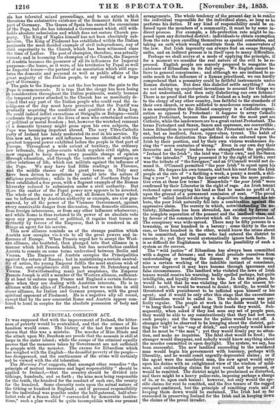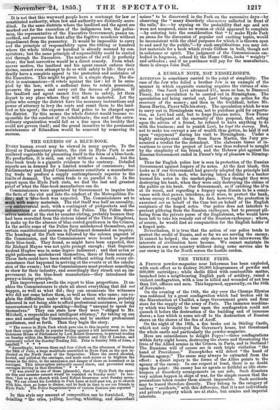AN EFFECTUAL COERCION ACT.
IT was supposed that with the improvement of Ireland, the bitter- ness of poverty would be neutralized, and that the crimes of Ri- bandism would cease. The history of the last few months has shown that this was a mistake. The murder of Miss Hinds and the attack upon Mr. Beecham are proofs that the assassin is still at large in the sister island; while the escape of the criminal equally proves that the measures taken by Government are not sufficient to grapple with the monster. The excuse for Ribandism which has weighed with the English—the dreadful poverty of the people—. has disappeared, and the continuance of the crime will certainly not be viewed with the old toleration.
The Morning Post suggests, that amongst other remedies "the principle of mutual insurance and legal responsibility " should be applied to Ireland,—that the country should be divided into tithings, hundreds, and so forth ; the nine men being responsible for the tenth, the hundred for the conduct of each one, the county for the hundred. Some obscurity rests upon the actual nature of the tithing or hundred in England ; and if personal responsibility for the individual was possible under the half-paternal, half-abso- lutist rule of a Saxon chief " surrounded by democratic institu- tions," such a plan would be quite incompatible with our present
arrangements. The whole tendency of the present day is to render the individual responsible for the individual alone, so long as he performs his duties. If any kind of responsibility could be en- forced 'upon the members of a community, it must be by some in- direct process. For example, a life-protection rate might be im- posed upon any disturbed district ; individuals to obtain exemption from the rate upon enrolling themselves as special constables, and taking an oath which would constitute them the conservators of the law. But Irish ingenuity can always find an escape through oaths, and an indirect process is in itself open to many difficulties. Perhaps we shall arrive at a mode of applying the principle, if for a moment we consider the real nature of the evil to be re- pressed. English people are scarcely prepared to recognize the existence of Ribandism in its full scope. We English cannot be- lieve in general conspiracies; and although we are inclined to as- cribe much to the influence of a Roman priesthood, we can hardly comprehend that a peasantry could be faithful instruments under Roman dictation. But does this disbelief settle anything? Are we not making up conjectural inventions to account for things we do not understand, and then only disbelieving our own fictions ? There is no proof that the priests of Ireland as a body are inferior to the clergy of any other country, less faithful to the standards of their own church, or more addicted to murderous conspiracies. It is an assumption that the Riband conspiracy is a Catholic organi- zation as opposed to Protestant : it happens to array Catholic against Protestant, because the peasantry for the most part are Catholic, while the landowners are to a great extent Protestant. The terms Protestant and Saxon, Saxon and oppressor, are convertible ; hence Ribandism is arrayed against the Protestant not as Protest- ant, but as landlord, Saxon, upper-class, tyrant. The habit of considering the distinction thus -defined is one enforced upon the Irish by their position, and by their own -vicious weaknesses du- ring the "seven centuries of wrong." Even in our own day their favourite and trusty leaders have strengthened the prejudice. "Ireland for the Irish" ; the land was "their own," and the Saxon was "the intruder." They possessed it by the right of birth; rent was the tribute of "the foreigner," and an O'Connell would not de- mand it. O'Connell permitted "the poor Irish" to squat upon his estate. He forgave his own tenants, and took his rent from the Irish people at the rate of "a farthing a week, a penny a month, a shil- ling a year "; but perhaps the larger estate was the more produc- tive even at these low terms P Meanwhile " the poor Irish" were confirmed by their Liberator in the right of rags. An Irish tenant reckoned upon occupying his land so that he made no profit of it, upon the ground of a permanent remission of rent. "The proud invader" called landlord showing a disposition to demand his trig bute, the poor Irish naturally fell into a combination comet the oppressive claim. The secrecy in which, notwithstan i its no toriety, Ribandism has been shrouded, has existed by your of the complete separation of the peasant and the landlord elessrand by favour of the common interest which all the conspirators had. The conspiracy was wide-spread. There may be fifty persons in a township, or four hundred in a barony : some thirty in the one case, or three hundred in the other, would know the crime about to be committed, and the man who had entered the district to execute it ; yet they would systematically ignore both facts. It is as difficult for Englishmen to believe tile possibility of such a system as the success. The "wild justice" of Ribandism has always been committed with a degree of fairness ; and we shall preclude ourselves from understanding or treating the disease if we refuse to recog- nize a certain working of the indelible instinct of conscience, however depraved it may have become through ignorance and false circumstances. The landlord who violated the laws of Irish tenure would receive his warning, badly spelled perhaps' but quite intelligible, and loyally delivered to him. In the first place, he would be told that he was violating the law of the unseen tri- bunal; next, he would be warned to desist ; thirdly, he would be threatened with punishment to be inflicted upon himself or his agent ; and it would be only after this stage that the executioner of Ribandism would be called in. The whole process was per- fectly regular. The people at work in the fields would be told "to hang their heads"; ; and hang their heads they would. Sub- sequently, when asked if they had seen any set of people pass, they would be able to say conscientiously that they had not seen such people ; and the traces for the police would be cut off. A stranger might be observed to be lounging about the district, get- ting his " bit " or his "sup of drink," and everybody would know that he must be "the man"; yet they would firmly pay no atten- tion, and make no inquiries. The fatal shot would be fired ; the stranger would disappear, and nobody would know anything about the murder committed in open daylight. The system, we say, has been successful. The new landlord succeeding to the murdered man would begin his government with leniency, perhaps with liberality, and he would remit urgently-deprecated claims ; or if the agent were the murdered man, the new agent would enter upon his duties with an enlightened view of the wisdom of mild- ness, and outstanding claims for rent would not be pressed, or would be remitted. The district might be proclaimed as disturbed, and there might be a heavy police-rate, imposing perhaps a charge of 3.s. or 4s. upon each tenant: however' not only would the spe- cific claims for rent be remitted, and the free tenure of the ragged occupant continued, but the principle of remitting rents and of keeping them down would be sustained. The Irish had so far succeeded in preserving Ireland for the Irish and in keeping down the claims of the proud invader. It is not that this wayward people have a contempt for law or constituted authority, when law and authority are distinctly accre- dited. In the same districts where the landlord and the agent are marked out for the execution of the indigenous law' the police- man, the representative of the Executive Government, passes un- scathed, and pursues the hunt after the fugitive murderer without impediment from the peasantry. It would be impossible to carry out the principle of responsibility upon the tithing or hundred where the whole tithing or hundred is already manned by con- spirators; but the same principle of responsibility could be carried out through the Executive. The nature of the evil is perfectly clear; the best corrective would be a direct remedy. From what- soever motive, the landlord and his agent cannot enforce their claims, cannot even attempt to do so with safety to life : they evi- dently have a complete appeal to the protection and assistance of the Executive. This might be given in a simple shape. The dis- trict is contumacious—it rebels against the law : let it be occu- pied by the law, with a sufficient force to retain possession, preserve the peace, and carry out the decrees of justice. If the landlord and agent cannot live there in safety, let them depart to any place where they will not be molested. Let the police who occupy the district have the necessary instructions and power of attorney to levy the rents and remit them to the land- lord or his agent ; the expense of that police to be charged upon the district. By this means the whole district would become re- sponsible for the conduct of its inhabitants ; the cost of the extra- ordinary organization would fall as a fine upon the locality that could not govern itself; and the grand incentive to the permanent maintenance of Ribandism would be removed by removing its success.

























 Previous page
Previous page